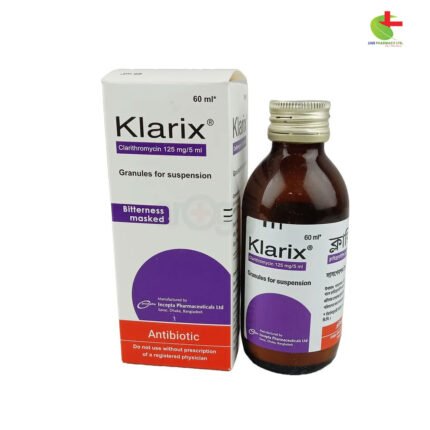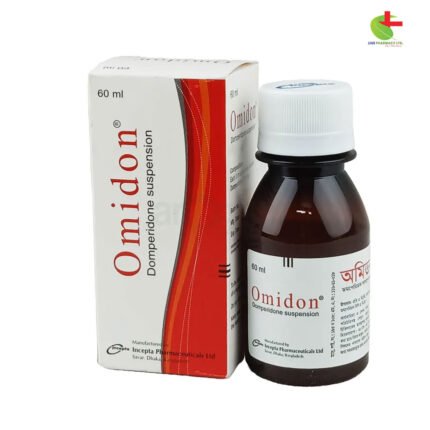

Purifen Oral Suspension
65.00৳ Bottle (100ml)
- Purifen is a non-steroidal anti-inflammatory drug (NSAID) indicated for the relief of pain and symptoms associated with osteoarthritis, rheumatoid disorders, primary dysmenorrhea, headaches, and mild to moderate pain.
- It contains Dexibuprofen, the active enantiomer of ibuprofen, which inhibits prostaglandin synthesis to provide analgesic and anti-inflammatory effects.
- Recommended dosages range from 600 to 1200 mg per day, depending on the severity of symptoms.
- Caution is advised for patients with asthma, hepatic or renal impairments, and during pregnancy and lactation.
 Brand
Brand
|
Incepta Pharmaceuticals Ltd |
|---|---|
 Generics
Generics
|
Dexibuprofen |
 Type
Type
|
Oral Suspension |
Indications
Purifen is recommended for:
- Relieving Osteoarthritis Symptoms: Effective in managing the discomfort associated with osteoarthritis.
- Rheumatoid Disorders: Indicated for conditions such as osseous rheumatism, ankylosing spondylitis, juvenile arthritis, muscular rheumatism, and degenerative joint diseases.
- Painful Menstruation: Provides acute symptomatic relief for primary dysmenorrhea.
- Headaches and Fever: Useful for treating common headaches and reducing fever.
- Mild to Moderate Pain: Alleviates various pain types, including muscle pain, headaches, and dental discomfort.
- Cold and Flu Symptoms: Serves as an adjunct treatment for headaches linked to common colds and influenza.
Consult a registered healthcare professional before using this medication.
Pharmacology
Dexibuprofen (S (+)-ibuprofen) is the pharmacologically active enantiomer of racemic ibuprofen. As a non-steroidal anti-inflammatory drug (NSAID), it possesses analgesic properties and functions by inhibiting prostaglandin synthesis, similar to ibuprofen.
Pharmacokinetics: Dexibuprofen is primarily absorbed in the small intestine. After undergoing metabolic transformation in the liver (including hydroxylation and carboxylation), the pharmacologically inactive metabolites are predominantly excreted by the kidneys (90%) and in bile. The elimination half-life ranges from 1.8 to 3.5 hours, and approximately 99% of the drug binds to plasma proteins. Peak plasma concentrations are typically achieved around 2 hours post-oral administration. Notably, taking dexibuprofen with food can delay peak concentration times (from 2.1 hours on an empty stomach to 2.8 hours when taken with food) and slightly decrease the maximum plasma concentrations (from 20.6 to 18.1 mcg/ml), though this change is clinically insignificant.
Dosage & Administration
Dosage should be tailored to the severity of symptoms and the patient’s complaints. For chronic pain, it’s crucial to adjust the dose to the minimum effective level.
Recommended Dosage:
- Standard Use: 600-900 mg of Dexibuprofen daily, divided into 2-3 doses.
- Acute Disorders: Temporarily increase to a maximum of 1200 mg daily for acute conditions or exacerbations.
- Dysmenorrhea: Administer 600 to 900 mg Dexibuprofen daily in divided doses.
Consult a registered healthcare professional before using this medication.
Interactions
Purifen may exhibit similar drug interactions as racemic ibuprofen. Notable interactions have been observed with:
- Anticoagulants
- Hydantoins and Sulfonamides
- Ticlopidine
- Lithium
- Other NSAIDs
- ACE Inhibitors
- Beta-blockers
- Cyclosporine and Tacrolimus
- Corticosteroids
- Digoxin
- Methotrexate
- Pentoxifylline
- Phenytoin
- Probenecid
- Sulfinpyrazone
- Sulfonylureas
- Thiazides and Thiazide-like Diuretics
- Zidovudine
Contraindications
Dexibuprofen is contraindicated in individuals with:
- Hypersensitivity: Previous reactions to Dexibuprofen, other NSAIDs, or any component of the product.
- Asthma or Allergies: Individuals prone to bronchospasm, acute rhinitis, urticaria, or edema following NSAID use.
- Active Conditions: Active or suspected hemorrhage, Crohn’s disease, or ulcerative colitis.
- Serious Health Issues: Severe heart conditions, impaired kidney function (GFR <30 ml/min), or liver dysfunction.
Side Effects
Common adverse effects associated with Purifen include:
- Gastrointestinal Issues: Dyspepsia, diarrhea, abdominal pain.
- General Symptoms: Fatigue, headache, nausea, and vomiting.
- Severe Reactions: Allergic responses such as bleeding or ulcers.
Pregnancy & Lactation
Pregnancy: While no teratogenic effects have been reported in animal studies, it’s advisable to avoid using dexibuprofen during pregnancy. Nonsteroidal anti-inflammatory drugs can adversely affect the fetal cardiovascular system (closure of ductus arteriosus), especially in late pregnancy.
Lactation: Research indicates that racemic ibuprofen is minimally transferred to breast milk. Therefore, dexibuprofen should be used cautiously in nursing mothers.
Precautions & Warnings
Purifen should be used with caution in individuals with:
- Asthma or Chronic Pulmonary Conditions: Those prone to allergies.
- Hepatic, Renal, or Cardiac Insufficiency: Regular monitoring is essential.
- Hypertension: Especially if uncontrolled.
Patients with systemic lupus or other autoimmune diseases should consult a healthcare provider prior to use. Purifen requires extreme caution in cases of active or suspected hemorrhagic conditions, including gastro-duodenal ulcers and ulcerative colitis. Allergic reactions may occur even in first-time users, and immediate discontinuation is necessary in such cases.
Use in Special Populations
- Hepatic Impairment: Initiate treatment at lower doses and monitor closely. Not recommended for severe liver dysfunction.
- Renal Impairment: Reduce starting doses in mild to moderate cases. Not suitable for severe kidney impairment.
- Children: While not approved for those under 18 in the UK, some countries allow use in children aged 6 and older, at 10-15 mg/kg daily divided into 2-4 doses.
- Elderly: Begin with the lowest effective dose, adjusting to the standard adult dosage if tolerated well.
Overdose Effects
Purifen has low acute toxicity. Symptoms of overdose typically manifest at doses between 80 and 100 mg/kg body weight, including:
- Mild Symptoms: Abdominal pain, nausea, vomiting, lethargy, headache, tinnitus, and ataxia.
- Severe Symptoms: Flatulence, hypotension, hypothermia, metabolic acidosis, reduced kidney function, coma, and apnea.
Treatment is symptomatic as no specific antidote exists. For large overdoses, activated charcoal may be administered. Inducing vomiting is only recommended for life-threatening doses within 60 minutes of ingestion. Dialysis is generally ineffective due to strong plasma protein binding.
Therapeutic Class
- Osteoarthritis Medications
- Rheumatoid Arthritis Treatments
- Non-steroidal Anti-inflammatory Drugs (NSAIDs)
Storage Conditions
Store at temperatures not exceeding 30°C, away from light, and out of reach of children.











Reviews
There are no reviews yet.